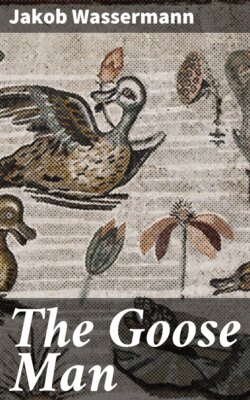Читать книгу The Goose Man - Jakob Wassermann - Страница 46
На сайте Литреса книга снята с продажи.
VIII
ОглавлениеTable of Contents
Daniel had just completed an orchestral work which he had entitled “Vineta.” He wished to have Benda hear it. One evening about six Benda came in. Everything was ready. Daniel sat down at the piano. His face was pale, his smooth upper lip was trembling.
“Now think of the sea; think of a storm; think of a boat with people in it. Picture to yourself a wonderful aurora borealis and a sunken city rising from the sea. Imagine a sea that had suddenly become calm, and in the light a strange phenomenon. Conjure up such a scene before your mind’s eye, or conjure up something totally different, for this is a false way of getting at the meaning of music. It is plain prostitution to think anything of the kind. Ice-flat.”
He was just about to begin, when some one knocked at the door. Eleanore entered. She whisked across the room, and took her seat on the sofa.
The piece opened with a quiet rhythmical, mournful movement, which suddenly changed to a raging presto. The melodic figure was shattered like a bouquet of flowers in a waterfall almost before it had had time to take shape and display real composure. The dissipated elements, scattered to the four corners of the earth, then returned, hesitatingly and with evident contrition, to be reunited in a single chain. It seemed that the mad whirlwind had left them richer, purer and more spiritual. They pealed forth now, one after the other, in a slow-moving decrescendo, until they constituted a solemn chorus played in moderato, melting at last into the lovely and serious main theme, which in the finale streamed away and beyond into infinity, dying out on an arpeggiated chord.
Where the piano failed to produce the full effect, Daniel helped out with his crow-like voice. It was the uncanny energy of expression that prevented his singing from having a comic effect.
Benda’s eyes were so strained in the effort to listen intelligently and appreciatively that they became dazed, glazed. Had he been asked he could not have said whether the work was a success or a failure. The feature of the performance that convinced him was the man and the magnetism that radiated from the man. The work itself he could neither fathom nor evaluate. It took hold of him nevertheless because of its inseparable association with the human phenomenon.
Daniel got up, stumbled over to the sofa, buried his face in his hands, and sighed: “Do you feel it? Do you really feel it?” He then rose, lunged at the piano, seized the score, and hurled it to the floor: “Ah, it’s no account; it is nothing; it is an abominable botch.”
He threw himself on the sofa a second time. Eleanore, sitting perfectly motionless in the other corner, looked at him with the eyes of an astonished child.
Benda had gone to the window, and was looking out into the trees and the grey clouds of the sky. Then he turned around. “That something must be done for you and your cause is clear,” he said.
Eleanore stretched out her arms toward Benda as though she wished to thank him. Her lips began to move. But when she saw Daniel she did not dare to say a word, until she suddenly exclaimed: “Heavens, there are two buttons on his vest which are hanging by a thread.” She ran out of the room. In a few moments she returned with needle and thread, which she had had Meta give her, sat down at Daniel’s side, and sewed the buttons on.
Benda had to laugh. But what she did had a tranquilising effect; she seemed to enable life to win the victory over the insidious pranks of apparitions.
